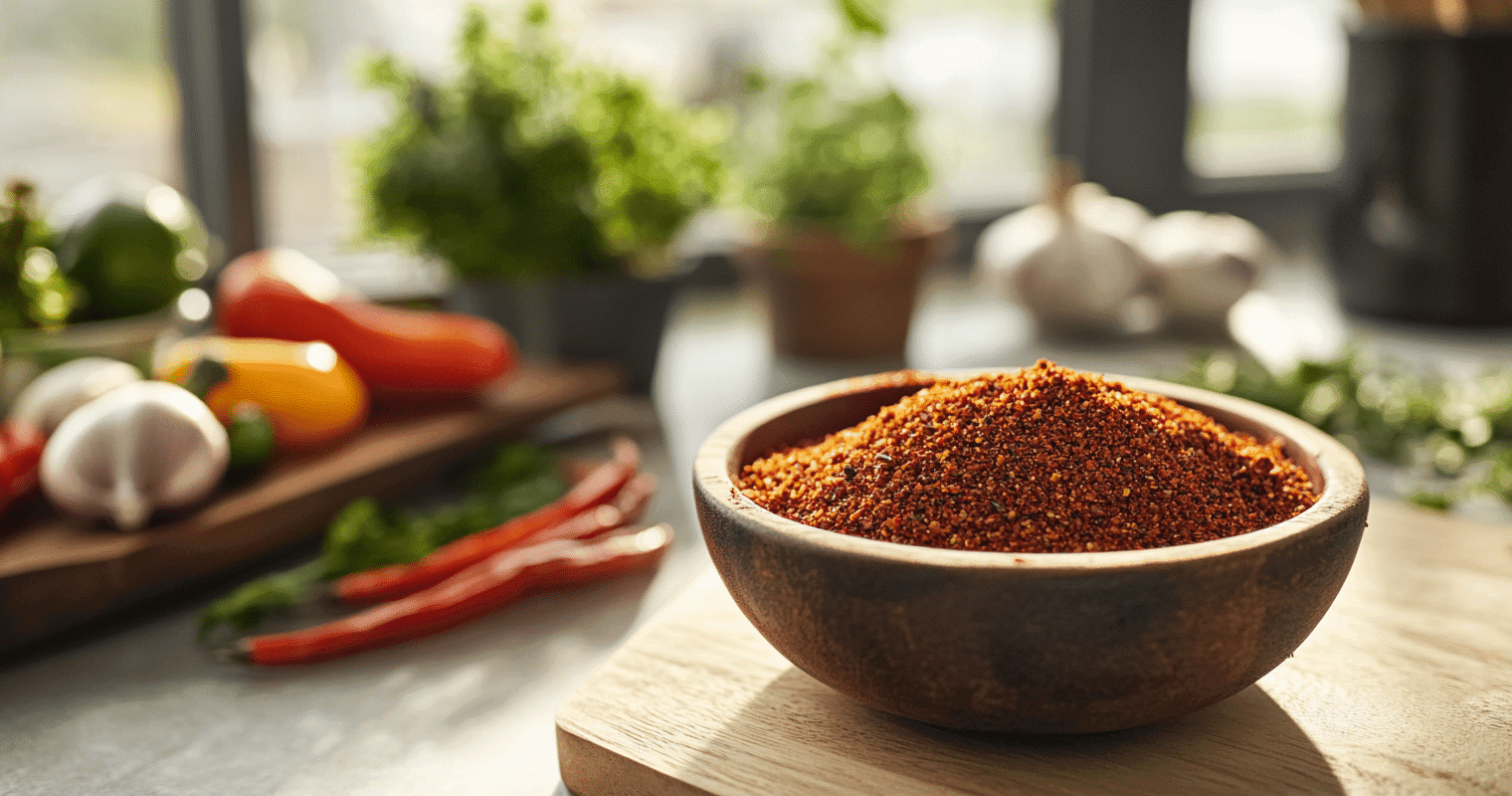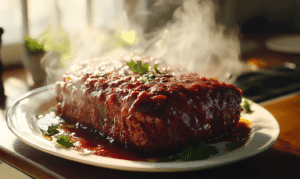Jump to:
Estimated reading time: 13 minutes
Table of contents
Introduction
Barbecue seasoning is a beloved staple in grilling, adding a rich, smoky flavor to meats, vegetables, and even some fruits. However, there are times when you might run out of your favorite seasoning, or you may want to try something new to switch up your barbecue game. That’s when knowing what to use instead of barbecue seasoning becomes essential. Understanding the various options available on the barbecue seasoning substitutes list can help you maintain flavor and keep your dishes delicious, even without your go-to seasoning.
This article will delve deep into the barbecue seasoning substitutes list, offering a comprehensive guide on the best alternatives you can use when you’re out of barbecue seasoning. Whether you’re looking for a homemade blend or a ready-made option, you’ll find plenty of ideas to keep your grilling flavorful and exciting. For those interested in enhancing their dishes with a smoky twist, check out this Spice-Rubbed Chicken Recipe. By the end of this article, you’ll have a well-rounded understanding of the best substitutes for barbecue seasoning and how to use them effectively to enhance your dishes.
Why You Might Need a Barbecue Seasoning Substitute List
Why a barbecue seasoning substitutes list ? Running Out of Barbecue Seasoning
One of the most common reasons you might search for a barbecue seasoning substitutes list is simply running out of your favorite blend. Whether you’ve planned a last-minute barbecue or just didn’t realize your supply was low, knowing what to use instead of barbecue seasoning can save the day. Rather than rushing to the store, you can often find suitable substitutes already in your pantry.
Why a barbecue seasoning substitutes list ? Dietary Restrictions or Preferences
Another reason to explore the barbecue seasoning substitutes list is dietary restrictions or preferences. Some store-bought barbecue seasonings contain ingredients that may not align with specific diets, such as gluten, sugar, or certain preservatives. In these cases, creating your own substitute allows you to control the ingredients and tailor the seasoning to meet your dietary needs.
Why a barbecue seasoning substitutes list ? Experimenting with New Flavors
Even if you have barbecue seasoning on hand, you might want to experiment with different flavors to bring a new twist to your grilling. The barbecue seasoning substitutes list offers a variety of options that can introduce new and exciting flavors to your dishes, keeping your meals fresh and interesting.
Common Ingredients in Barbecue Seasoning Substitute List
The Core Elements of Barbecue Seasoning
Before diving into the barbecue seasoning substitutes list, it’s helpful to understand the core elements of traditional barbecue seasoning. Most blends contain a mix of the following:
- Paprika: Adds a sweet and smoky flavor and gives the seasoning its signature red color.
- Brown Sugar: Provides sweetness and helps create a caramelized crust on grilled foods.
- Garlic Powder: Adds a robust, savory flavor that complements the smokiness.
- Onion Powder: Enhances the savory notes with a mild, sweet flavor.
- Black Pepper: Contributes heat and depth to the seasoning.
- Cayenne Pepper: Introduces a spicy kick, adjustable to your taste.
- Salt: Essential for enhancing the natural flavors of the food.
The Role of Herbs and Spices
In addition to these core ingredients, many barbecue seasonings include various herbs and spices that add complexity and depth to the flavor. These might include:
- Thyme: Adds a subtle earthiness and a hint of lemon.
- Oregano: Brings a slightly bitter, herbal note that balances sweetness.
- Cumin: Offers a warm, earthy flavor with a touch of bitterness.
- Chili Powder: Combines multiple spices to add heat and complexity.
Understanding these elements will help you better navigate the barbecue seasoning substitutes list and choose alternatives that replicate or complement these flavors.
The Barbecue Seasoning Substitutes List: Best Alternatives
1. Homemade Barbecue Seasoning Blend
One of the most effective options on the barbecue seasoning substitutes list is creating your own homemade blend. This option allows you to tailor the seasoning to your taste and dietary preferences.
Basic Homemade Barbecue Seasoning Recipe:
- 2 tablespoons paprika
- 1 tablespoon brown sugar
- 1 tablespoon garlic powder
- 1 tablespoon onion powder
- 1 teaspoon black pepper
- 1 teaspoon cayenne pepper (optional, for heat)
- 1 teaspoon salt
Instructions:
- Mix all the ingredients in a bowl until well combined.
- Store the blend in an airtight container in a cool, dry place.
- Use as a 1:1 substitute for store-bought barbecue seasoning.
This homemade blend is a versatile option that can be adjusted depending on your preferences. For example, add smoked paprika for extra smokiness or more brown sugar for sweetness.
2. Cajun Seasoning
Cajun seasoning is a spicy, flavorful blend that can stand in for barbecue seasoning when you want a bit more heat in your dishes. It typically includes paprika, garlic powder, onion powder, black pepper, cayenne pepper, and sometimes herbs like thyme and oregano.
Why It Works:
Cajun seasoning shares many of the same core ingredients as barbecue seasoning, making it a natural choice on the barbecue seasoning substitutes list. It adds a similar depth of flavor with an extra kick of spice, perfect for those who enjoy a bit of heat.
Best Uses:
- Grilled Chicken: Cajun seasoning pairs well with chicken, offering a spicy alternative to traditional barbecue flavor.
- Shrimp or Seafood: It’s also excellent for seasoning shrimp or other seafood, giving it a bold, zesty flavor.
- Vegetables: Sprinkle Cajun seasoning on vegetables before grilling for a spicy twist.
3. Chili Powder
Chili powder is another excellent option on the barbecue seasoning substitutes list. While it’s typically used in Tex-Mex and Southwestern dishes, its combination of ground chili peppers, garlic powder, onion powder, and cumin makes it a versatile substitute.
Why It Works:
Chili powder offers a similar blend of savory and spicy flavors found in barbecue seasoning. The addition of cumin adds an earthy note that complements the smokiness often associated with barbecue.
Best Uses:
- Beef: Chili powder works particularly well with beef, adding a rich, smoky flavor to steaks, burgers, and brisket.
- Tacos or Burritos: Use it as a seasoning for taco or burrito fillings for a flavorful alternative to barbecue seasoning.
- Pork: It can also be used to season pork ribs or chops, providing a bold, spicy flavor.
4. Smoked Paprika and Brown Sugar Mix
If you’re looking for a simple yet effective substitute, combining smoked paprika and brown sugar can replicate much of the flavor profile found in barbecue seasoning. Smoked paprika provides the smoky, savory flavor, while brown sugar adds the sweetness and helps create a caramelized crust on grilled foods.
Why It Works:
This combination hits the key flavor notes of barbecue seasoning—smoky, sweet, and savory—making it a great addition to the barbecue seasoning substitutes list. For more creative seasoning options, you can also explore Too Much Breadcrumbs in Meatloaf. It’s also easy to adjust the proportions to match your taste.
Best Uses:
- Chicken or Pork: This mix works well on chicken or pork, adding a sweet and smoky flavor that’s reminiscent of traditional barbecue.
- Ribs: Use it as a rub for ribs before grilling or smoking to achieve a rich, caramelized crust.
- Vegetables: Sprinkle on vegetables before grilling or roasting for a simple yet flavorful dish.
5. Adobo Seasoning
Adobo seasoning is a versatile blend commonly used in Latin American and Caribbean cuisine. It typically includes garlic powder, onion powder, oregano, black pepper, and sometimes turmeric and cumin.
Why It Works:
Adobo seasoning offers a savory, aromatic flavor that can serve as an effective substitute on the barbecue seasoning substitutes list. While it lacks the sweetness of traditional barbecue seasoning, its robust flavor makes it a suitable alternative for those who prefer a more savory profile.
Best Uses:
- Grilled Meats: Adobo seasoning works well with a variety of meats, including chicken, pork, and beef.
- Tofu: It’s also a great option for seasoning tofu, providing a savory, aromatic flavor that complements the mild taste of tofu.
- Beans and Rice: Use it to season beans or rice for a flavorful side dish that pairs well with grilled foods.
6. Jamaican Jerk Seasoning
Jamaican jerk seasoning is a flavorful, spicy blend that includes allspice, thyme, garlic, and scotch bonnet peppers. It’s known for its bold, aromatic flavor and is commonly used in Caribbean cuisine.
Why It Works:
Jamaican jerk seasoning adds a complex, spicy flavor to the barbecue seasoning substitutes list. While it’s more intense than traditional barbecue seasoning, it offers a unique alternative for those looking to experiment with new flavors.
Best Uses:
- Chicken or Pork: Jamaican jerk seasoning is traditionally used on chicken or pork, adding a spicy, aromatic flavor that’s perfect for grilling.
- Seafood: It also works well with seafood, particularly shrimp or fish, giving them a bold, zesty flavor.
- Vegetables: Use it to season vegetables before grilling for a spicy, flavorful twist.
7. Italian Seasoning with a Smoky Twist
Italian seasoning is a blend of herbs like basil, oregano, rosemary, and thyme. While it’s typically associated with Italian cuisine, adding smoked paprika or chipotle powder can transform it into a suitable substitute on the barbecue seasoning substitutes list.
Why It Works:
Italian seasoning provides a rich, herbal flavor, while the addition of smoked paprika or chipotle powder introduces the smokiness and heat associated with barbecue seasoning. This combination offers a balanced, flavorful alternative. For more versatile seasoning ideas, check out Baking Soda in Meatloaf.
Best Uses:
- Chicken: This blend works particularly well with chicken, adding a herby, smoky flavor that pairs well with grilled poultry.
- Pork: It can also be used on pork, providing a balanced flavor profile that enhances the natural sweetness of the meat.
- Vegetables: Use it to season grilled or roasted vegetables for a Mediterranean-inspired twist on barbecue flavors.
8. Garam Masala
Garam masala is a blend of ground spices commonly used in Indian cuisine, including coriander, cumin, cardamom, and cloves. Its warm, aromatic flavor can serve as a unique addition to the barbecue seasoning substitutes list.
Why It Works:
Garam masala adds a warm, spicy flavor that can complement the smoky elements of barbecue. While it’s different from traditional barbecue seasoning, its complex flavor profile offers a creative alternative.
Best Uses:
- Lamb: Garam masala pairs particularly well with lamb, adding a warm, aromatic flavor that enhances the rich taste of the meat.
- Chicken or Beef: It can also be used on chicken or beef, providing a unique twist on traditional barbecue flavors.
- Vegetables: Use it to season vegetables before grilling for a flavorful, aromatic dish.
How to Customize Your Barbecue Seasoning Substitutes List
Adjusting Heat Levels
One of the benefits of using a substitute from the barbecue seasoning substitutes list is the ability to adjust the heat level to suit your taste. If you prefer a spicier seasoning, consider adding more cayenne pepper, chili powder, or even crushed red pepper flakes to your chosen substitute. On the other hand, if you prefer a milder flavor, reduce or omit the spicy ingredients.
Adding Sweetness
If your chosen substitute lacks the sweetness found in traditional barbecue seasoning, you can easily add this element by incorporating brown sugar, honey powder, or even a touch of maple syrup. This addition helps balance the savory and spicy flavors, creating a well-rounded seasoning.
Introducing Smoky Flavors
Smokiness is a key characteristic of barbecue seasoning, and you can replicate this flavor in your substitute by adding smoked paprika, chipotle powder, or even a touch of liquid smoke. These ingredients introduce a rich, smoky flavor that enhances the overall seasoning. For more ways to incorporate creative flavors, check out Best Homemade Barbecue Chips.
Incorporating Fresh Herbs
While most barbecue seasonings rely on dried herbs, you can elevate your substitute by incorporating fresh herbs like thyme, rosemary, or oregano. Fresh herbs add a vibrant, aromatic quality that complements grilled foods beautifully.
Tips for Using Barbecue Seasoning Substitutes List
How to Apply Seasoning to Meat
When using a substitute from the barbecue seasoning substitutes list, it’s important to apply it effectively to get the best flavor. Here are some tips:
- Dry Rub Method: Sprinkle the seasoning evenly over the meat and rub it in with your hands. Ensure that all sides of the meat are well-coated. This method works well for ribs, chicken, and pork.
- Marinade Method: Mix the seasoning with olive oil, vinegar, or lemon juice to create a paste. Coat the meat with the marinade and let it sit in the refrigerator for a few hours or overnight. This method is ideal for tougher cuts of meat that need more time to absorb the flavors.
- Timing: Apply the seasoning at least 30 minutes before grilling to allow the flavors to penetrate the meat. For more intense flavor, season the meat the night before and refrigerate it.
Pairing Substitutes with Different Foods
The barbecue seasoning substitutes list isn’t just for meat—it can also be used to add flavor to a variety of foods. Here’s how to make the most of your seasoning:
- Vegetables: Toss vegetables like zucchini, bell peppers, and asparagus with olive oil and a generous sprinkle of seasoning before grilling. The seasoning adds a savory depth that enhances the natural sweetness of the vegetables.
- Tofu: Use the seasoning to add flavor to tofu before grilling or pan-frying. The bold flavors of the seasoning blend can elevate the mild taste of tofu, making it a great option for vegetarian barbecues.
- Corn on the Cob: Spread butter on corn on the cob and then sprinkle it with the seasoning before grilling. The seasoning adds a smoky, savory flavor that pairs perfectly with the sweetness of the corn.
Storing Your Barbecue Seasoning Substitutes List
Proper storage is key to preserving the flavor and potency of your barbecue seasoning substitutes. Here are some tips for storing your seasoning blend:
- Airtight Container: Store the seasoning in an airtight container to keep out moisture and air, both of which can cause the spices to lose their potency.
- Cool, Dry Place: Keep the container in a cool, dry place away from direct sunlight. Heat and light can degrade the quality of the spices over time.
- Label and Date: Label the container with the name of the seasoning and the date it was made. This will help you keep track of freshness.
Frequently Asked Questions: Barbecue seasoning substitutes list
Can I use BBQ seasoning substitutes for vegetables and seafood?
Yes, substitutes like Cajun or taco seasoning, or a simple smoked paprika blend, work well on vegetables and seafood. Adjust the spice level to suit your preferences. For fish, try a lighter mix of paprika, lemon zest, and garlic powder for a BBQ-inspired flavor.
Can I use liquid substitutes instead of dry BBQ seasoning?
Yes, you can use liquid options if the recipe allows for it:
Barbecue Sauce: Use as a marinade or glaze to mimic the flavors of BBQ seasoning.
Soy Sauce and Honey: Mix these with a dash of smoked paprika or chili powder for a tangy and sweet flavor.
Liquid Smoke: Add a drop or two to your dish for smokiness, along with basic seasonings like salt and garlic.
Conclusion: Mastering the Barbecue Seasoning Substitutes List
Understanding what to use instead of barbecue seasoning is crucial for anyone who loves to grill. Whether you’ve run out of your favorite seasoning, have dietary restrictions, or simply want to experiment with new flavors, the barbecue seasoning substitutes list provides a wide range of options to keep your grilling flavorful and exciting.
From homemade blends to store-bought alternatives, each substitute offers a unique flavor profile that can enhance your dishes. By customizing your substitutes with additional ingredients, you can create a seasoning that perfectly suits your taste and the type of food you’re cooking. For more inspiration on creative seasoning, consider exploring Why Barbecue Chips Are Delicious.
With the barbecue seasoning substitutes list in hand, you’re now ready to take your grilling to the next level and create delicious, flavorful dishes that will impress your friends and family. Happy grilling!






